Motivating Gen Z within your organization or externally as your consumers can be puzzling, but it’s not impossible. This is one of the most interesting, dynamic, and inspirational generations. It’s important for marketers to not only know how to connect with them as consumers but also work with them.
The spectrum of Gen Z stretches from kids in junior high to 26-year-olds on their fifth business endeavor. So, how do marketing leaders motivate one of the most informed, culturally sensitive, entrepreneurial, and emotionally aware generations to date? While there’s no perfect equation, it’s important to distinguish how this generation differs from every other generation.
The more we understand the cultural climate that they’ve grown up in, the context they were raised in, and how they engage in the world, we can show up for our teams and consumers in a way that resonates and reaches this hard-to-get but easy-to-love generation.
The Visionaries on the forefront of motivating Gen Z inside and out are:
- Andréa Mallard, Chief Marketing and Communications Officer at Pinterest
- Barbara Messing, Chief Marketing and People Officer at Roblox
- Rachel Delphin, CMO at Twitch
- Steven Tristan Young, CMO at Poshmark
- Dylan Gambardella, Co-founder and CEO at Next Gen HQ
- Ziad Ahmed, CEO at JUV Consulting
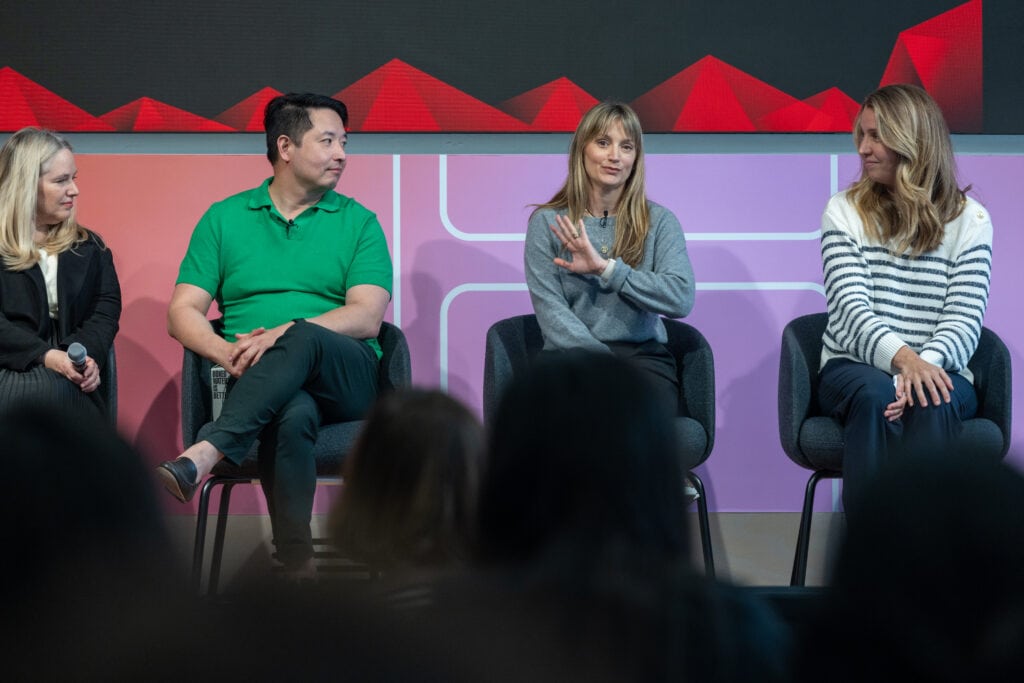
Listen to their full conversation to hear their insightful examples and real use cases on the MTM Visionaries Podcast, available on your favorite streaming platform.
5 Tips on Motivating Gen Z
1) Learn their language, both digital and emotive
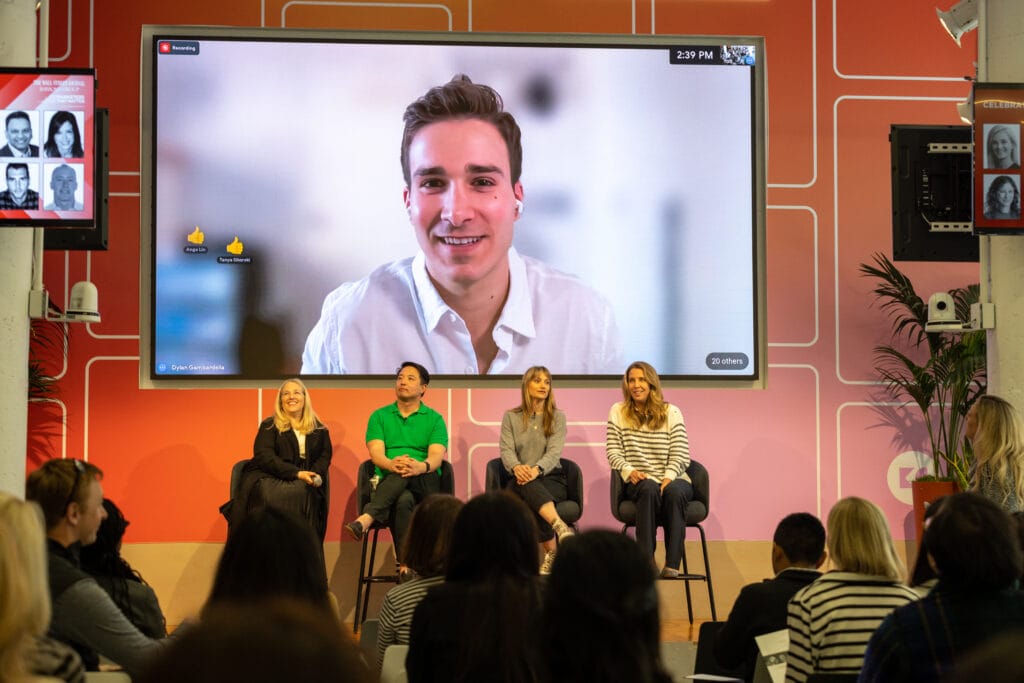
Gen Z is known for being digital natives. They grew up fully immersed in a connected world, unlike older millennials, who experienced the rise of the internet alongside traditional media. From day one, Gen Z was immersed in technology, with the classic example being the iPod and stroller combo. This deep relationship with technology influences everything, mostly for the better, such as adapting to new technologies like ChatGPT and AI.
–Dylan Gambardella (Next Gen HQ)
Gen Z speaks social media as a first language, and I think that’s why in so many ways, Gen Z is pushing towards a phygital world, one where the physical and digital are integrated.
–Ziad Ahmed (JUV Consulting)
This generation has vast emotional language about how they feel and how they think about the world. And as a leader, if you don’t have that next level of emotional intelligence, it will be tough. They’re not just emotionally aware but hard- working, entrepreneurial, and come up with the best ideas. It’s a double-edged sword, but if you can understand how to create that environment where they are heard, acknowledged, and not just validated but really understood, you get to reap a lot more of that benefit.
–Steven Tristan Young (Poshmark)
The way Gen Z has emotional self-awareness and the ability to express themselves is unbelievably impressive. Previous generations literally did not have the language, nor did they feel they had the permission.
–Andréa Mallard (Pinterest)
2) Give them freedom and tools to express their identity and shape their world
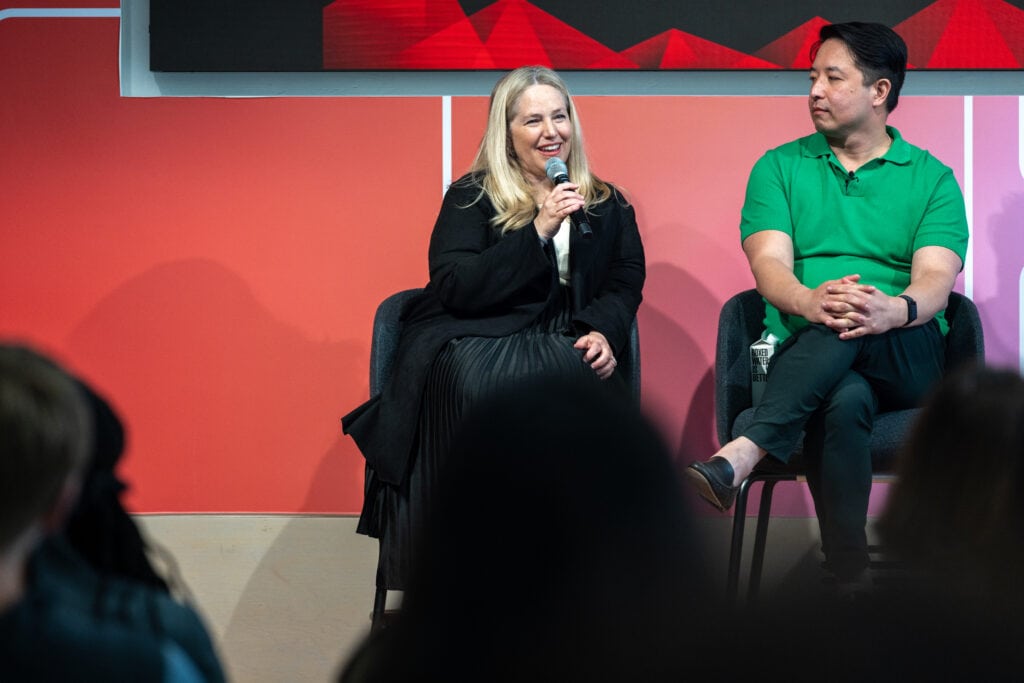
Our Gen Z community on Roblox wants to express themselves uniquely; we call it the notion of “many me’s.” People want to be different things at different stages, on different platforms, and in different parts of their lives. They don’t want to be defined by anyone else but themselves. Creation is at the core of Roblox. We give our developers and creators the tools to create whatever they want to create. That is why our community and Gen Z are so intertwined. For our employees, we want to bring people to Roblox who have that mindset, are optimistic, are shaping the world they want to shape, and are excited to give people tools to do the same.
–Barbara Messing (Roblox)
From a brand perspective, we don’t broadcast to the community; we contribute to the community. We have to participate with them. Community is a term many brands, people, and institutions adopt, but it’s a really active word. You must be present, actively engaged, and participating. Even in the position of a brand, where we may have more power in some situations, we see ourselves as contributors.
–Rachel Delphin (Twitch)
When I think about the audience at Poshmark, they are the Airbnb and Uber audience. Possessions for them are circular. They pay attention to experiences, and they want agency over their lives. For everyone on the platform, whether they’re joining or have been there for a while, we want them to make their mark, whether in their world, their own lives, or their communities. Our Gen Z audience may not be creators, but they create something bigger than themselves when they sell on our platform. That’s what makes the Gen Z audience powerful.
–Steven Tristan Young (Poshmark)
3) Protect their mental and emotional wellbeing
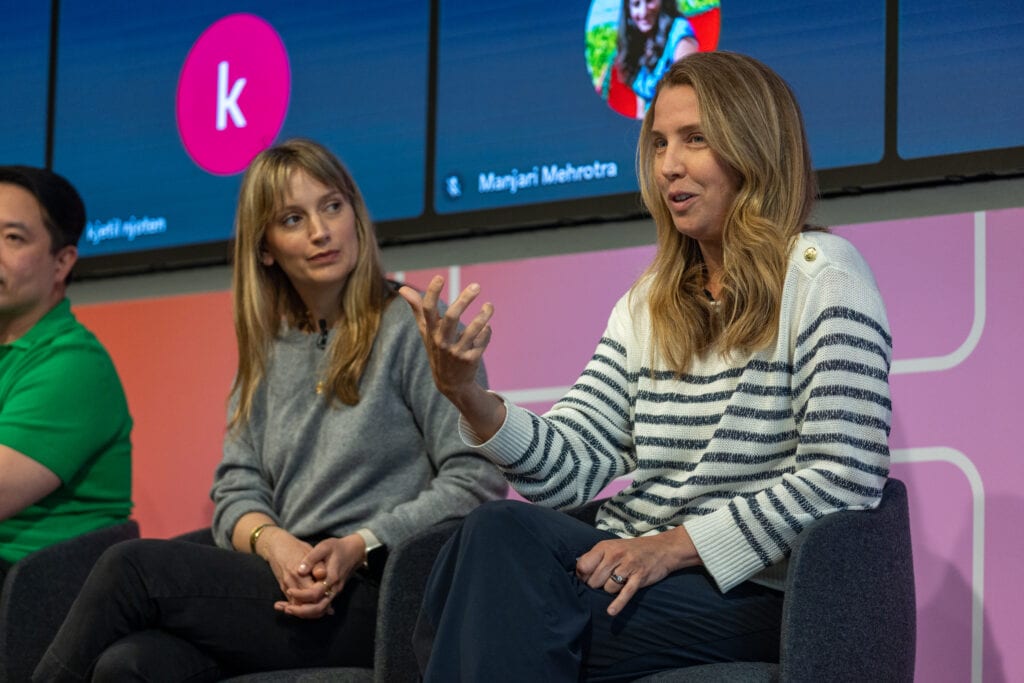
Gen Z is the first generation to be truly digitally native in every way. But this has also led to enormous challenges to emotional well-being. Younger people are experiencing record levels of depression, disconnectedness, and anxiety. I’d argue that growing up in an environment where one’s sense of self is profoundly shaped by the currency of what others—including vitriolic strangers on social media—think of them. Ordinary activities that used to be private are now done on a digital stage, so ordinary life starts to feel like a competition or a race at a much earlier age.
We’re seeing that Gen Z is actually looking for an escape from this always-on, hyperconnected world, where they can figure out who they are without the constant input or approval of others. Brands like Pinterest are being thoughtful about truly protecting emotional well-being and psychological safety by deliberately designing an experience that allows people to explore and discover their tastes and interests outside the relentless scrutiny or opinions of others.
It is critical that we enable moments of true inner development that do not always depend on a community, especially for a generation that has never had an opportunity to build their understanding of themselves before they were forced to perform it for others.
–Andréa Mallard (Pinterest)
More than ever, we’re focusing on creating places for people to get help and easy access to mental health professionals. We have gathering spaces at Roblox, where we have general sharing sessions run by an outside firm that we use. As companies now, we have to support people at every part of their lives. I think the pandemic broke down any facade we had around home versus work. Now we have a greater understanding of how people come to work with everything happening in their daily lives. We have to be empathetic and support people at every part of their journey and where they are personally and professionally.
–Barbara Messing (Roblox)
A key part of having a leadership role is creating resources and programs for mental health, spaces for safe dialogue, and employee resource groups that develop a sense of belonging, but we must model that as well. It’s not just for them; it’s also for me. My employees have opened up to me about many things I would never have heard if I wasn’t willing to tell them about myself.
–Rachel Delphin (Twitch)
4) Appreciate their voice and recognize their why
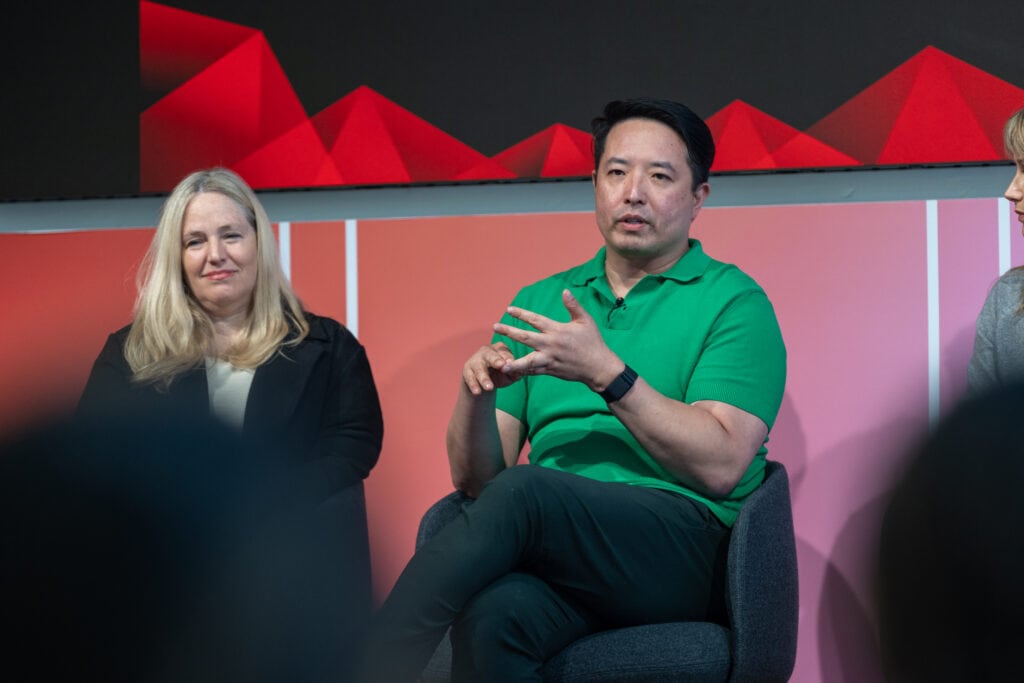
As a leader, listening is not always easy. However, with my Gen Z employees, they are very direct about what they think and what they’re not happy with in management. There is no lip service; they genuinely want to be heard and feel valued in the workplace. I don’t think they are complainers; they want to know that there is a path for them and that they will receive coaching and development. It’s important to them that there is an equal exchange of value in their time and effort. Overall, I think this desire for open communication and direct feedback is a beautiful thing. It shows that they are invested in the institution and want to contribute to its success.
–Steven Tristan Young (Poshmark)
Internal mobility and having real ownership is a big deal for working with Gen Z. The average young person is not a fan of hierarchy and the leadership that comes top down without having a say. If we can have a seat at the table, we feel comfortable when sharing our ideas.
–Dylan Gambardella (Next Gen HQ)
Gen Z is growing up in a world where there is deep distrust of many institutions, and subsequently, there is a fundamental critique and re-imagination of what the society, world, systems and state can look like. [For instance, around sustainability] Because Gen Z is so well-versed in content and information, they’re saying, “the world is on fire, but the statistics tell me I’m not the one who’s going to fix it. It has to be the corporations; it has to be the folks who are doing the majority of emissions.”
–Ziad Ahmed (JUV Consulting)
5) Access is everywhere, but mentorship still matters
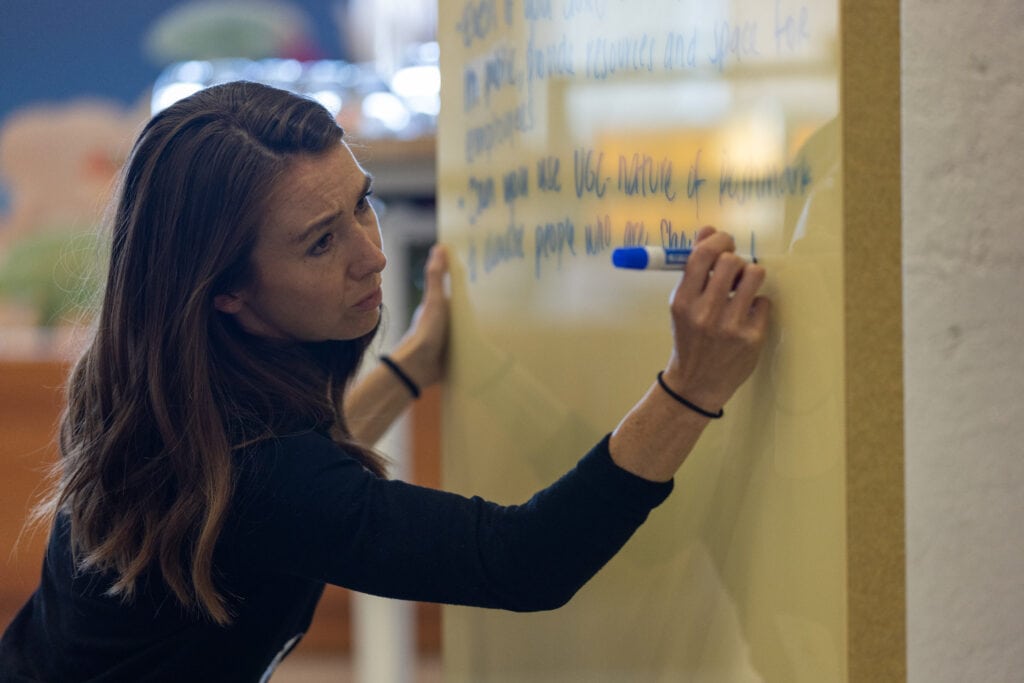
For Gen X and older millennials, the notion of starting a business in high school would have been like saying you wanted to go to Mars. Yet for Gen Z, there is unprecedented access to audience and business-building tools right at this generation’s fingertips. But though the barriers to entry may be lower than ever, we’re seeing that though Gen Z feels they can “do it for themselves,” there’s a paradoxical need and desire for true mentorship. It’s easier than ever to think you know it all because the tools to feign that knowledge and ability are ubiquitous. My challenge to older generations: don’t let the bravado fool you. Trusted mentorship is critical and, we’re learning, deeply desired. Gen Z has so much to offer, but so do the Millenials and Gen X eager to support and guide them.
–Andréa Mallard (Pinterest)
The folks that we look up to aren’t just the parents in the neighborhood anymore. It’s the entrepreneurs, creators, and brand builders, and that is simply powered by social media and technology. It’s easier to revere an entrepreneur when you can see their progress in real-time and feel that more closely online. This mentorship is available at our fingertips.
–Dylan Gambardella (Next Gen HQ)
Summary
To co-create a healthy world for all of us in it, it is imperative that marketing leaders go the extra mile and create safe spaces for this generation to grow in health while simultaneously developing their own digital agility and emotional awareness that will earn the right to motivate Gen Z. Winning the hearts and trust of this generation means showing up consistently for them in real, responsible, honoring, and authentic ways. As a leader of younger leaders in their own right, truly listening, embracing and empowering them to live their lives marked by joy, peace, purpose, and love is a magical formula for collaboration and true growth for our collective world.
____________________________________
Find the MTM Visionaries Podcast On Apple, Spotify, Amazon, and more!
Visionaries, hosted by Nadine Dietz, airs every week and is brought to you in partnership with The Wall Street Journal. Each week, two new visionaries share their game plan and how that impacts today’s teams, talent, and hybrid work environment.
Meet The Visionaries
Andréa Mallard, Chief Marketing and Communications Officer at Pinterest: Andréa is Chief Marketing Officer at Pinterest. She oversees the global marketing, insights and creative teams responsible for telling the Pinterest story to Pinners, Creators and Businesses all over the world. As a published author and in-demand speaker around the globe, she speaks and writes enthusiastically about brand strategy, entrepreneurialism, product innovation and design thinking. Andréa has been named Ad Age’s 2021 Marketer of the Year, a 2021 Ad Age Leading Woman and a 2021 Brand Innovators Top 100 Women in Brand Marketing.
Barbara Messing, Chief Marketing and People Officer at Roblox: As Chief Marketing & People Experience Officer, Barbara Messing leads all aspects of marketing, communications, and employee experience operations at Roblox. She is responsible for overseeing the development of the company’s global brand strategy. Barbara has driven innovation and continued growth and established Roblox as one of the most beloved brands among kids and teens. Prior to Roblox, Barbara spent the last two decades serving in a number of leadership roles, including Senior Vice President and Chief Marketing Officer at Walmart U.S. and TripAdvisor. She currently serves on the Board of Directors for Overstock.com and Vacasa. Barbara holds a JD from Stanford Law School and a BA from Northwestern University.
Dylan Gambardella, Co-founder and CEO at Next Gen HQ: Dylan Gambardella is an entrepreneur, investor, and fitness enthusiast. He is the CEO and Founder of Next Gen HQ. He has been recognized as a Forbes 30 Under 30 entrepreneur and is the best-selling author of Now That’s Momentum. At Next Gen HQ, Dylan and his team are building NextGen Skills: an AI-powered platform that helps the next generation train, assess, and apply in-demand skills to succeed at work and in life. Dylan has been featured in Forbes, Inc, Adweek, Entrepreneur, Fox, CNBC, USA Today, and Cheddar, and has spoken in front of tens of thousands on global stages including TEDx, ASU+GSV, and Advertising Week. He is a graduate of Duke University ’18.
Rachel Delphin, CMO at Twitch: Rachel Delphin is the Chief Marketing Officer at Twitch, where she has served for the last five years–starting as the Vice President of Communications. Prior to Twitch, she worked as the Head of Communications for brands including Tanium and Twitter. Rachel received her Bachelor’s Degree in Marketing, International Relations at the University of Florida. She lives in San Francisco with her two dogs, two kids, and one husband.
Steven Tristan Young, CMO at Poshmark: Steven Tristan Young is the Chief Marketing Officer at Poshmark, the leading US Social Commerce platform. Prior to Poshmark, Steven was the VP of Growth at Grubhub, the US leading online and mobile food ordering company. Steven has also held leadership positions at DIRECTV, American Express, Endurance International Group and Puma Sports. Steven received his undergraduate degree from The Wharton School at the University of Pennsylvania and is an alumnus of Harvard Business School.
Ziad Ahmed, CEO at JUV Consulting: Ziad Ahmed is a 24-year-old entrepreneur. He is the CEO of JUV Consulting, a Generation Z company that works with clients to help them connect with young people. JUV has worked with over 20 Fortune 500 companies, has been profiled by the New York Times, and has launched major purpose-driven TikTok campaigns. Because of JUV, Ziad was named to the 2019 Forbes #30Under30 list when he was 19-years-old. Ziad is a recent graduate from Yale. Additionally, Ziad is the Founder of Redefy, a youth-run non-profit committed to furthering equality. He speaks often on the power of his generation, and he seeks to use his voice to push the envelope forward wherever/however possible.
Marketers That Matter® is a community of top marketing executives coming together to pioneer the future of marketing, sharing real-time experiences, and solving current challenges.
Our parent company, 24 Seven, specializes in helping you find exceptional marketing and creative talent for your teams.

